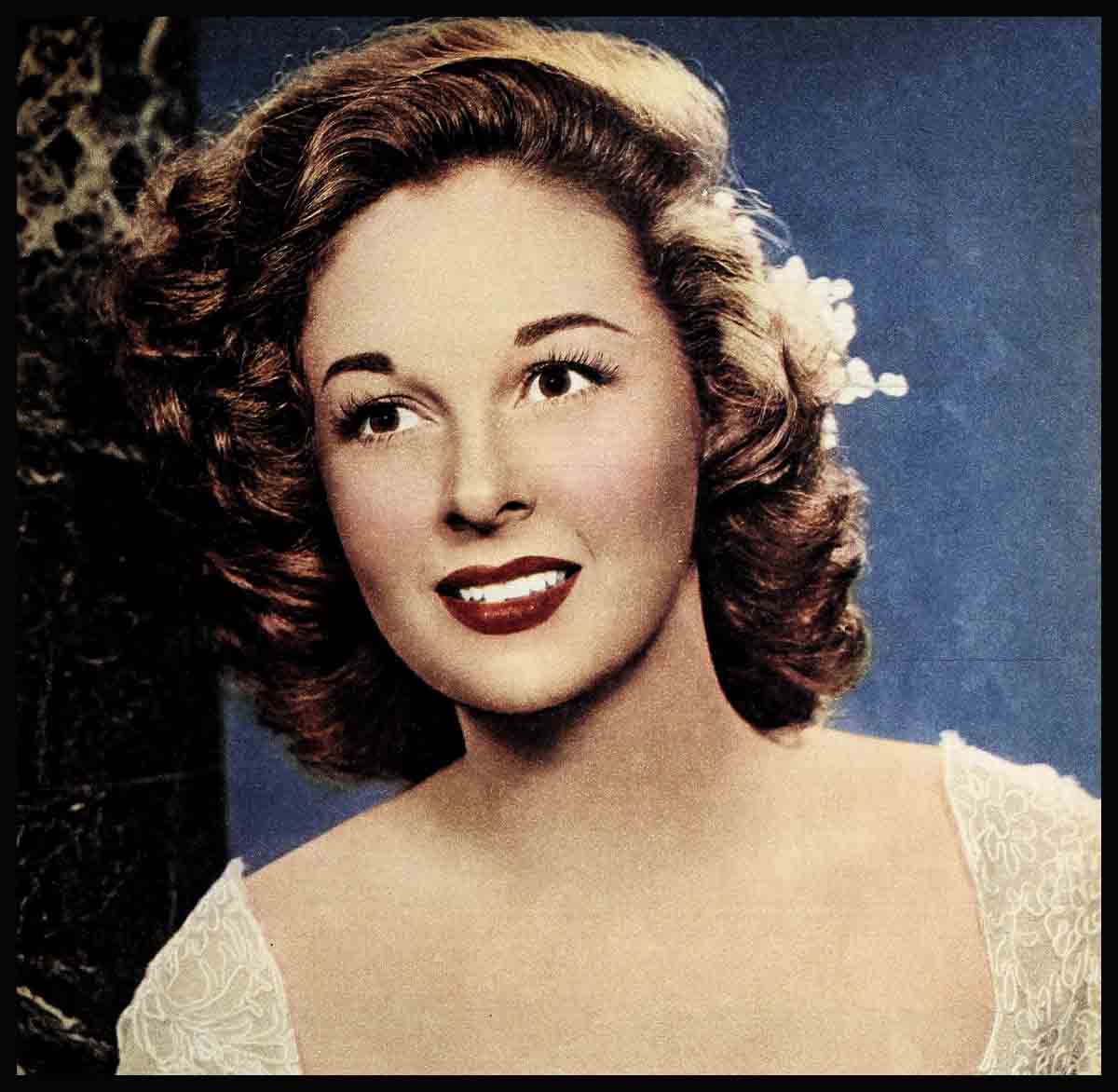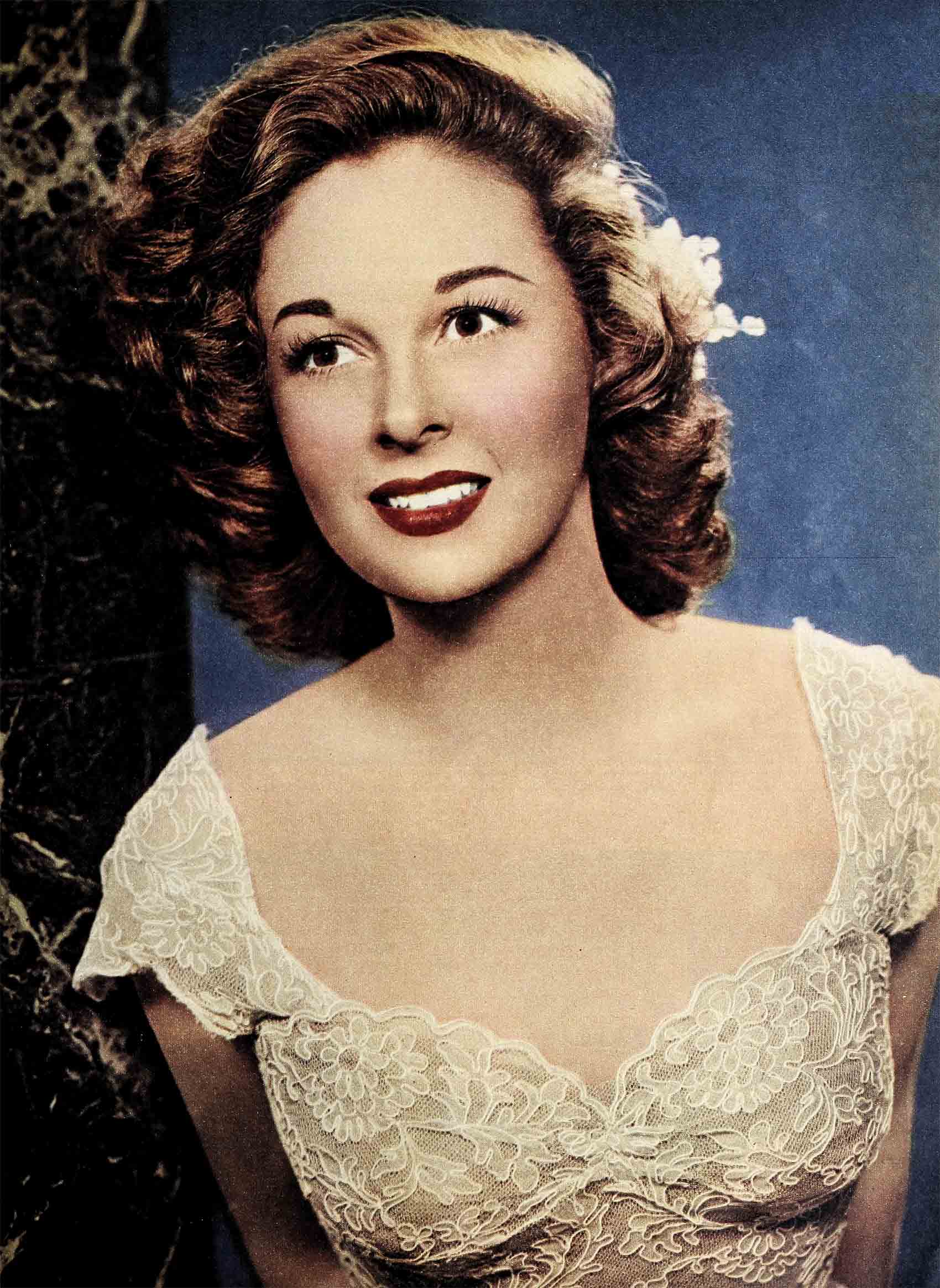
Brooklyn Goes To Bat—Susan Hayward
They were driving home after the premiere of “My Foolish Heart.” Jess was quiet. He knew how Susan felt. When she had left the theater, a crowd had applauded her all the way to their car. This was her big night.
Susan was quiet, too. As the car came to the top of the hill, she saw the bright lights of the San Fernando Valley ahead of her. Once before she had looked down on lights that had danced the same way because, then, too, her eyes had been filled with tears. She’d been in New York, standing at the window of a hospital ward. She well remembered her father, a jaunty figure with jet black hair and eyes so dark they seemed black, too; his Irish face strong and warm, alive with laughter.
“I hope you don’t get it.” He spoke from his hospital bed. He had lost his fight. He knew that. But, maybe he could help her win hers. “I hope you don’t get it,” he said it again. And watched the eager light go from her face. Jubilantly, she had come to tell him her good news. The famous David O. Selznick had seen her picture on a magazine cover. He had sent for her to come to Hollywood to test for the coveted role of Scarlett O’Harain “Gone with the Wind.”
He didn’t like to hurt her. But he and Susan never had pulled their punches. “I hope you don’t get it,” he had said, still more strongly.
But why?” she had asked. “Why? If I get this part, I’ll be a great movie star. I’ll make more money in one year than I otherwise would manage to make for the rest of my life,” she had said.
She had thought to herself, we can all leave that dirty flat, with the trolleys rumbling by. Soot on the pillows. We can afford those wonderful butter cakes at Ebinger’s bakery for sixty cents. We can sit in a box at Ebbets Field instead of feeling guilty for days about the money we spent for two bleacher seats to see the Brooklyn Dodgers play. And at Christmas . . . we can have a real Christmas tree. A tall tree. Never, until late on Christmas Eve when the stores were ready to throw the leftovers away, could they choose a tree.
But, most of all, she had thought, moving from the window, standing beside her father’s bed, if I get it, I’ll take you out of this hospital ward. I’ll take you where there’s sunshine. And flowers. Where you can get well and strong and laugh again. . . .
The doctor had warned him to take it easy months before, when he’d had that other heart attack. To quit work. But her father, wire chief of the Interborough Rapid Transit Company, couldn’t quit. Not until he had to. Then, one day, he’d just fallen over in the street and they’d brought him here. But, if I get this, you can quit for keeps. She couldn’t understand his attitude. She was going to fight for this chance. He had taught her from childhood to fight for whatever she wanted. “The harder they hit you, the higher you’ll bounce. That is, if you’re a good ball to start with,” he’d always said. “And if you’re not, you might as well give up anyway.”

Theirs was a realistic Brooklyn neighborhood. It was the survival of the fight-ingest in Flatbush. She learned that at the tender age of seven, when the block bully socked her. She’d just stood there rubbing her face for a minute, surprised that a boy would hit a girl so hard. And then she hit pack. A weak slide that barely brushed his chin. Inside the old, worn, red brick hull where they lived, she explained her disheveled appearance to her parents with a brief, “He hit me.” Her father had lowered his newspaper to inquire politely whether or not she had retaliated. “Not good,” she said grimly. But she practiced for days, sparring with her brother Wally. And the next time, she connected. “Right on the nose,” she reported, triumphantly oblivious of the smudge on her own.
She’d landed on her feet in that bit of sidewalk drama. And in others. So many more. Her own private fight against self-consciousness and shyness, inspired by poverty. Against an overpride.
And it was you, always you, she had thought, taking her father’s hand, who helped me to win. You, who taught me to strive harder. Fight harder. The new dress I didn’t have for the class play. It was you who had said, “Play your part well and nobody will notice. If you’re convincing enough, the audience will watch you, not what you wear.” Others complimented me, but never you. Instead, you were always pinning me down afterwards with, “In that second act, why did you do such-and-such?” And when I had said, “I don’t know,” you had insisted, “Well, don’t you think you should know?” You, who had always forced me to think. To probe every facet of a characterization, even in a little high school play. And when, after I won the scholarship and took lessons at a drama school, and begged every producer on Broadway to give me a part, a walk-on, one line, and got a round-robin of, “Get-in-a-show-and-I’ll-come-to-see-you,” it was you who had dared me to get discouraged . . . to quit.
He had almost been able to read his daughter’s thoughts, as he had studied her face, as though he was committing every beloved feature to heart. She was more than a beauty. She had fire, tenderness, sympathy. She had fight and heart. His saucy daughter with the fiery red curls and big brown eyes had the magic of true talent. From childhood, the spark had been there. But, it must be developed and given a fair chance to grow.
Now, a producer had seen a picture of a girl in a sweater, with a wind-blown bob, and was offering her fame too fast.
He knew he’d have to make her understand.
“You’re no actress. Not yet,” he had said. “Scarlett O’Hara is a most sought-after role. Millions who have read the book wait eagerly to see the Scarlett who will play it, will render their verdict.
“To be an actress is like being a doctor or a lawyer. You have to learn your business first. It takes talent, and for you, that will be easy.” He had smiled, paying her a rare compliment. “But, it also takes time. Perhaps, in ten years.”
“Rhett Butler won’t wait that long,” she had laughed, hoping to leave him on this lighter note. Visiting hours were over.
“For your sake, I hope you don’t get it,” he had said again. And didn’t smile.
That was the last time she saw him. She had wired him that she had been turned down for the part. But he was in a coma most of the time, the day her wire arrived, they told her later. They weren’t sure he understood.
In the years that followed, Susan was to realize how right her father had been.
The harder they hit you, the higher you bounce. They had hit her hard and often. But always she had bounced back.
“Go back home, and grow up,” Selznick had advised her. “Get some experience in stock, or something.” Susan waited for all the “and-so-forths” to finish and returned with, “Thanks for the train ride.” In her eyes, the same spark of the seven-year-old Susan who lost the preliminary bout with the bully back in Brooklyn.
She had been signed by Warners, well-briefed in bathing suits and cheesecake photos for six months, then dropped.
“She stinks,” the man behind the desk at Republic had announced, matter-of-factly, when an agent took her out to read for a role in a Western film.
Another contract, at Paramount. More cheesecake. The same routine, until Susan had wondered wearily just how much “bounce” she had left. Perhaps she hadn’t been a good ball to start with, after all.
Finally, a small part in “Beau Geste.” Then, better roles. Roles that found Susan despairing of her every performance. She was acutely self-critical, never satisfied, she cringed out of sneak previews.
“Quit torturing yourself, honey. You weren’t that bad,” her husband Jess Barker would tease. “But I should have done it so much better,” she’d wail.
Now and then, a small triumph. Like the scene in “Smash-Up.”
“Jess, I cracked my voice on cue today. You know how hard I’ve always tried. Today, it worked. Right on cue.”
But, months later, in a studio projection room, when she saw the whole picture, that familiar wilting again. When the lights went on, an unhappy Susan had rushed across the room to producer Walter Wanger with, “I’ll do so much better the next time. I promise you.”
Wanger, keeping a straight face and trying to match her seriousness with, “I hope so. I sincerely hope so.”
She could never understand why she was nominated for the Academy Award. And now . . . “My Foolish Heart.”
They were practically home now. Susan reached into Jess’s pocket, groped for his handkerchief.
Jess tried to play it lightly. “Don’t tell me the picture got you, too?”
She shook her head. “I was just thinking about Dad, wishing he could have been here tonight.”
Jess patted her hand. “It wouldn’t have surprised him, would it, that there was a hit when Brooklyn went to bat?”
THE END
—BY MAXINE ARNOLD
It is a quote. PHOTOPLAY MAGAZINE MARCH 1950




